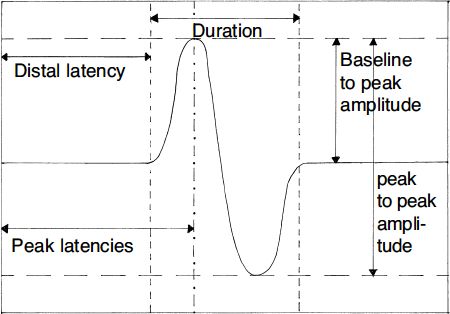NCS-SENSORY TESTING PARAMETERS
SUMMARY
Tip: amplitude is decreased in axonal neuropathies; CV & latency are prolonged in demyelination
1. Onset latency: is the time required for an electrical stimulus to initiate an evoked potential. This reflects the conduction along the fastest fibers. - Prolonged in demyelination.
2. Peak latency: represents the latency along the majority of the axons and is measured at the peak of the waveform amplitude.
- Prolonged in demyelination.
3. Amplitude: represents the size (number of axons participating) of the response, measured from baseline to peak or from peak to peak, depending upon how the reference data were collected.
- Varies with stimulus intensity, impedance, skin temperature.
- Reduced with axonal neuropathies, conduction block in demyelination.
- Elevated in early denervation leading to polyphasic potentials.
4. Conduction velocity (CV): distance between the stimulation and recording electrodes divided by the onset latency.
- Prolonged in demyelination.

Reference(s)
Wilkinson, I., Furmedge, D. and Sinharay, R. (2017). Oxford handbook of clinical medicine. Oxford: Oxford University Press. Get it on Amazon.
Feather, A., Randall, D. and Waterhouse, M. (2020). Kumar And Clark’s Clinical Medicine. 10th ed. S.L.: Elsevier Health Sciences. Get it on Amazon.
Hannaman, R. A., Bullock, L., Hatchell, C. A., & Yoffe, M. (2016). Internal medicine review core curriculum, 2017-2018. CO Springs, CO: MedStudy.
Therapeutic Guidelines. Melbourne: Therapeutic Guidelines Limited. https://www.tg.org.au [Accessed 2021].